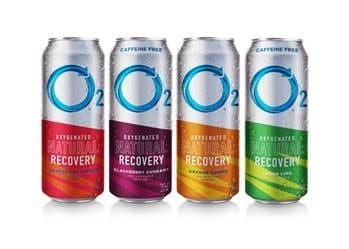Beverage
R&D
Moving from the gym into the mainstream
By Barbara Harfmann
Sports recovery, bone and joint health meets needs of mindful consumer
(Image courtesy of PepsiCo)
In the battery-operated game “Operation,” players must carefully remove a “patient’s” Adam’s apple, water on the knee, or wrenched ankle with a pair of tweezers without touching the sides of the cavity or the large red lightbulb nose of “Cavity Sam” will go off. In an attempt to help athletes and fitness-minded consumers prevent bone and joint problems and to more fully recover after workouts, sales in the “sport recovery game” are climbing as consumers turn to these products to enhance their everyday lives.
According to Mordor Intelligence, the global recovery drinks market is growing at a compound annual growth rate (CAGR) of 6% during the 2019-2024 forecast period. The steady growth reflects broader trends in the sports nutrition marketplace, as these products move beyond the weight room and into the mainstream, it states.
“Sports recovery drinks remain a growing market,” says Ramon Mommersteeg, marketing manager for performance and active nutrition at FrieslandCampina Ingredients, Paramus, N.J. “In 2021, the overall sports nutrition industry reached a global value of $47.5 billion and is expected to experience a CAGR of 7.9% between 2022-2027.
“And sports recovery drinks that leverage high-quality protein are an incredibly popular choice within the category,” he continues. “In fact, 31% of global consumers regularly snack on ready-to-drink protein drinks as a healthy alternative to soft drinks. Alongside recovery from exercise, consumers associate protein with a health halo effect, which is driving demand as people look to become healthier and stronger post-pandemic.
Noting the importance of taste to beverages, Cargill’s Carla Saunders says that regardless of how many vitamins, minerals and proteins are included in a formula, “if it falls short on taste, consumers won’t give it a second chance,” she says. (Image courtesy of Cargill)

Healthy hydration
Sports recovery drinks are an opportunity for brands to educate consumers about the importance of muscle recovery and joint health issues, says David Tetzlaf, director of marketing at Blue California. “It appears their efforts are paying off,” he notes.
For on-the-go hydration, FrieslandCampina offers its NutriWhey Isolate Clear, a highly adaptable ingredient that can be used in a range of ready-to-drink (RTD) beverages to deliver high-quality protein that aids in sports recovery, Mommersteeg says.
Citing an April 2021 survey by FMCG Gurus, Blue California’s Tetzlaf explains that 66% of consumers are interested in bone and joint health products even when not suffering specific health problems, and 71% find products positioned around the bone and joint health more appealing. The survey reports that 45% are consuming more dairy products during the past 12 months to improve bone and joint health.
The Rancho Santa Margarita, Calif.-based company, in partnership with Sweegen (also headquartered in California), offers a plethora of products in this space, including RTD beverages, powders and gels with plant-based ingredients, such as natural sweeteners, including stevia, Tetzlaf says.
Noting that many diets can be vitamin K2 deficient, Blue California offers a highly bioactive vitamin K2 (MK-4) which is essential for activating several vitamin K-dependent proteins, including ones that play a role in bone metabolism, and coenzyme Q10 for protection against oxidative stress during strenuous exercise.
”One systematic review of randomized controlled studies on vitamin K1 and K2 found that vitamin K2 supplementation as MK-4 significantly reduced the risk of bone fractures,” Tetzlaf says. “In addition, both vitamins K1 and K2 were associated with increased bone mineral density. For increased bioavailability, we also now offer MK-7. Additionally, a recent cohort study of over 50,000 participants over 23 years suggests that a diet rich in vitamin K2 is inversely associated with the risk of hospitalizations related to plaque build-up in arteries. This finding is another indicator of why K2 is an important aspect of cardiovascular health.”
“The aging demographic, and those looking for active lifestyles, seek nutrients to keep fit, energetic, and healthy. Vitamin K2 is an ideal ingredient for supporting bone health and reducing the risk of bone fractures.”
— David Tetzlaf, director of marketing at Blue California

Chicago-based Glanbia Nutritionals also offers solutions for bone and joint heath with MenaQ7 Vitamin K2 MK-7, a first-in-class, clinically researched vitamin K2 (MK-7) that is clinically validated and patented for cardiovascular benefits; and TruCal Balanced Milk Mineral Complex, which has been scientifically shown to help improve bone density and strength. Both ingredients can be used in tablets, capsules, powder drink mixes and more.
Glanbia’s Senior Manager for Strategic Insight Sonja Matthews explains that “MK-7 works by binding to calcium that gets lodged along the arterial walls and shuttles it to the bone, where it is needed. Only MenaQ7 is clinically validated and patented for cardiovascular benefits.”
Experts note that while the mineral calcium has long been a mainstay for promoting strong bones and teeth, consumers now are better educated about the synergies in bone health of other vitamins, minerals and nutrients such as magnesium, vitamin D3, vitamin K2 and collagen.

Created by a CrossFit trainer and a medical doctor, O2 Sports Recovery Drink is a post-workout beverage blending seven times the oxygen of tap water with electrolytes to help the body process toxins and recover faster, the company says. (Image courtesy of O2 Sports Recovery Drink)
Transformative strength
Sports recovery products generally are used post-exercise, while bone and joint products are used for longer-term relief from soreness or pain. Because these functional products have found a broader audience, they must reach a higher bar in terms of taste, says Carla Saunders, senior marketing manager at Minneapolis-based Cargill.
“Taste is paramount; no matter how many vitamins, minerals and proteins are included in the formula, if it falls short on taste, consumers won’t give it a second chance,” Saunders explains. “At the same time, however, consumers are wary of sugar-laden products. Not so long ago, formulators simply dialed up the sugar to cover off flavors — but today’s sports nutrition consumer scrutinizes labels to avoid high-calorie drinks as well as those made with artificial sweeteners.
“In response, brands are creating products with reduced sugar or even no-sugar-added, and relying on plant-based solutions like stevia to deliver on taste,” she continues. “The change is paying off, too, as beverages made with stevia deliver growth rates that dramatically outperform the beverage category as a whole.”
In mid-February, Gatorade, a brand of Purchase, N.Y.-based PepsiCo, unveiled a new fitness product to its portfolio: Gatorade Fit. Available in Tropical Mango, Watermelon Strawberry, Citrus Berry, Cherry Lime, Tangerine Orange, Gatorade Fit is formulated with no added sugar, no artificial flavors, sweeteners or added colors, and delivers 100% of the daily value of antioxidant vitamins A and C, as well as electrolytes sourced from watermelon and sea salt, the company says.
In addition to taste and fortifying with calcium, protein, vitamins and minerals, Lauren Clardy, vice president of brands at AIDP Inc., notes that more consumers are seeking branded, science-back ingredients.
“Consumers want to feel a difference when choosing a product with a science-backed ingredient,” Clardy says. “According to the Ingredient Transparency Center survey, interest in branded ingredients, which generally are science backed, is rising significantly (30% always looking for them vs. 16% last year). Most supplement users appreciate finding a product that has branded ingredients, even if they aren’t always searching them out”
(Video courtesy of Cargill)
A total of 42% of younger consumers are always looking for branded ingredients, while 20% of consumers aged 18-35 are willing to pay a premium for branded ingredients, Clardy says. Meanwhile, the bone and joint segment skews older than the sports nutrition segment, and more women, due to osteoporosis and the fact that they have smaller, thinner, less dense bones than men.
When it comes to which consumers are purchasing which products, Clardy further explains: “Bone and joint are about 8% of the supplement category according to [Nutritional Business Journal] NBJ. This segment tends to skew to an older demographic of 46-plus and is the No. 1 reason for taking supplements according to a 2021 survey by Ingredient Transparency Center.”
To meet the needs of consumers post-exercise as well as to help provide long-term relief from bone/joint soreness or pain, the City of Industry, Calif.-based company offers its clinically researched and patented Turmacin ingredient. Because the ingredient also has FDA GRAS status and in non-staining, it is ideal for use in beverages and shots because it brings the joint and cartilage health benefits of turmeric to the masses, Clardy says.
She explains that the primary bioactives in Turmacin are turmerosaccharides — a group of water-soluble bioactive polysaccharides present in turmeric (curcuma longa), which are responsible for its joint health supporting properties.
“Its unique mode of action supports the integrity of healthy joint cartilage along with anti-inflammatory and collagen-boosting mechanisms,” Clardy explains. “Turmacin is an excellent choice for endurance products because it increases the time to onset of pain during exercise, allowing fitness enthusiasts to push harder, longer. It also effectively eases joint pain and increases joint mobility in physically active people.”
Yet, the ingredients used to power up functional drinks can come laden with offnotes. Cargill’s new advanced, zero-calorie sweetening system — EverSweet + ClearFlo sweetener — boasts powerful flavor modifying properties that can help manage off flavors from other ingredients used in formulation, be it earthy notes from proteins, bitterness from caffeine or metallic tastes from potassium chloride, Saunders says.

Citing an April 2021 survey by FMCG Gurus, 66% of consumers are interested in bone and joint health products even when not suffering specific health problems, says Blue California’s David Tetzlaf. (Image courtesy of Blue California)
However, application challenges can occur when using antioxidants or formulating protein drinks that can replenish energy and facilitate muscle recovery and repair. Casey McCormick, director of product development at Sweegen, notes that the company collaborates with brands to offer zero-calorie natural stevia sweeteners and taste modulation in beverages for controlling bitterness, linger, flavor and sweetness enhancements.
Spurring on growth in sports nutrition
Improving joint health remains a hot topic. The Netherlands-based Innova Market Insights reports that sports nutrition is the top category accounting for 37.1% of food and beverage launches tracked globally with joint health claims. It also exhibits the highest growth (up 50.6%) in the Top 10 categories from April 2016-March 2021. Dairy products with joint claims outpaced soft drinks with 12%, in front of cereal and carbonated soft drinks.
“The aging demographic, and those looking for active lifestyles, seek nutrients to keep fit, energetic, and healthy. Blue California’s Vitamin K2 is an ideal ingredient for supporting bone health and reducing the risk of bone fractures, along with resistance training to maintain bone strength,” Blue California’s Tetzlaf says.
Plant-based minerals from the sea — Aquamin — also are making their mark in the category. Distributed in North America by Stauber USA, Fullerton, Calif., and manufactured by Marigot Ltd., Cork, Ireland, the Aquamin line is a calcium rich mineral complex from red algae harvested in the fjord of Iceland, while the Aquamin Mg line is a rich mineral complex produced from Irish sea water, explains Stauber’s Patrick Stano Sr., account executive and brand manager.
Since they began working together more than five years ago, the companies have seen business double because their plant-based minerals are clinically proven to be effective, Stanos says.
Marigot’s Commercial Director David O’Leary explains that its plant-based minerals from seaweed have been shown to enhance bone mineralization in osteoblast formation and also to reduce pain, stiffness and improve walking distance while reducing reliance on NSAID medications.
“Our plant minerals have been tested against widely recognized materials such as glucosamine and shown to outperform by being more efficacious,” O’Leary says. “So we fit both sports recovery along with bone and joint health categories because our range is well developed that they can be used as a plant based, clean label science proven form of electrolytes and minerals for recovery in sports category. Similarly for bone and joint health multiple studies now underpin the material as a source of natural minerals for bone and joint health in healthy aging categories.”
In addition to bone health, AIDP’s vitamin K2 plays an important role in regulating calcium balance, influencing bone and heart health, Clardy says. “Calcium is needed by the body for skeleton building, muscle contraction, nerve signaling and other metabolic processes,” she explains. “However, excess calcium can accumulate in blood vessels and other soft tissues. K2VITAL is an ideal solution to this paradox. Supplementation with K2VITAL directs calcium to the right place, to the bones, supporting bone strength and circulatory health.”
Experts note that the future for the sports recovery, bone, and joint health category within beverages is strong, particularly as sugar reduction solutions using stevia open up new flavors and taste modulation solutions and health benefits, Blue California’s Tetzlaf says.
“Easy to consume joint health products with collagen appears to be on the horizon,” Tetzlaf says. “A couple of challenges would be to overcome off-tastes imparted by nutrition in functional beverages and keeping it low calorie.”
Glanbia’s Matthews concludes: “Expect more people to come to the category as more people continue to adopt healthier, more active lifestyles — bone and joint health is relevant to all. Additionally, aging populations will increase the joint health category.” BI
